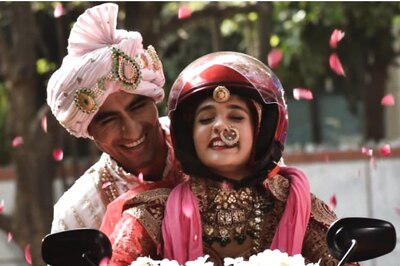
views
One of his films in particular, Anuradha did more than just entertain. It gave me an attitude. I saw the film first as a kid when Doordarshan was the only TV of choice. What struck me then was the gentle, ethereal and most unlike any Hindi film star, heroine I had ever seen. It was Leela Naidu in and as Anuradha, a talented singer who chooses to give up her formidable talent and the chance of a fulfilling career as a singer to follow the man she loves, an idealist doctor who chooses to serve rural India.
The story's message went out to a society that took and still takes for granted the contribution women make in their roles as wives and mothers. The film was an ode to women who in their giving of unstinting support to the people around them have forfeited their ambition.
Ironically what I took from it was different. Some of the seeds of the desire to be my own person; to single-mindedly pursue my potential, were definitely sown by this film Mukherjee made.
In another film Anupama he picked a story where an idealistic writer Dharmendra, resists the urge to go charging in to rescue the woman he loves, Sharmila Tagore. The straightforward message behind the love story, the woman has to make her own considered decisions.
As a filmmaker Mukherjee was a feminist, in the best sense a man can be. While his female characters were not liberated in the way we understand the concept, the men in his movies were if not already enlightened were being compelled to be.
So while the histrionics of Anand and the joyous absurdity of Golmaal make you feel good to be alive, Hrishikesh Mukherjee's Anuradha and Anupama make you grateful for the way you live your life.first published:September 02, 2006, 10:30 ISTlast updated:September 02, 2006, 10:30 IST
window._taboola = window._taboola || [];_taboola.push({mode: 'thumbnails-mid-article',container: 'taboola-mid-article-thumbnails',placement: 'Mid Article Thumbnails',target_type: 'mix'});
let eventFire = false;
window.addEventListener('scroll', () => {
if (window.taboolaInt && !eventFire) {
setTimeout(() => {
ga('send', 'event', 'Mid Article Thumbnails', 'PV');
ga('set', 'dimension22', "Taboola Yes");
}, 4000);
eventFire = true;
}
});
window._taboola = window._taboola || [];_taboola.push({mode: 'thumbnails-a', container: 'taboola-below-article-thumbnails', placement: 'Below Article Thumbnails', target_type: 'mix' });Latest News
It's hard to pick a favourite Hrishikesh Mukherjee film. From rib tickling carefree Wodehousian takes on middleclass life and morality to deeply moving, unusually sensitive relationship dramas, to use a cliché, in Mukherjee's body of films there's something for everybody, or rather a film for every mood.
One of his films in particular, Anuradha did more than just entertain. It gave me an attitude. I saw the film first as a kid when Doordarshan was the only TV of choice. What struck me then was the gentle, ethereal and most unlike any Hindi film star, heroine I had ever seen. It was Leela Naidu in and as Anuradha, a talented singer who chooses to give up her formidable talent and the chance of a fulfilling career as a singer to follow the man she loves, an idealist doctor who chooses to serve rural India.
The story's message went out to a society that took and still takes for granted the contribution women make in their roles as wives and mothers. The film was an ode to women who in their giving of unstinting support to the people around them have forfeited their ambition.
Ironically what I took from it was different. Some of the seeds of the desire to be my own person; to single-mindedly pursue my potential, were definitely sown by this film Mukherjee made.
In another film Anupama he picked a story where an idealistic writer Dharmendra, resists the urge to go charging in to rescue the woman he loves, Sharmila Tagore. The straightforward message behind the love story, the woman has to make her own considered decisions.
As a filmmaker Mukherjee was a feminist, in the best sense a man can be. While his female characters were not liberated in the way we understand the concept, the men in his movies were if not already enlightened were being compelled to be.
So while the histrionics of Anand and the joyous absurdity of Golmaal make you feel good to be alive, Hrishikesh Mukherjee's Anuradha and Anupama make you grateful for the way you live your life.




















Comments
0 comment